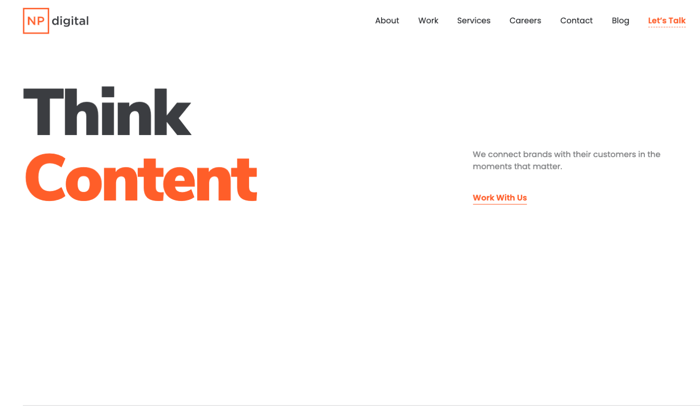
Content marketers who blog regularly receive 55 percent more website visitors and 67 percent more leads than those who don’t. Organizations that prioritize content marketing receive 13X more ROI than those that don’t.
It’s no secret that content marketing works.
What’s difficult is showing up day after day, with fresh content your readers find educational and valuable. After a while, the content marketing arms race can become a grind. If you have the right content marketing agency, growth is easier. It’s simple to create content that’s focused, helpful, and profitable.
Know your content marketing goals and desired outcomes
Research from the Content Marketing Institute shows 80 percent of B2B marketers use metrics to measure their content performance, 65 percent have set KPIs, and 43 percent measure their content marketing ROI.
Do you?
If you’re not sure about your goals and desired outcomes, content marketing can become an expensive black hole. Successful content marketing starts with setting goals and objectives. The metrics and KPIs you use depends on a few different factors — the size and location of your business, your industry, and your circumstances. Here’s a list of the top six metrics marketers have used to measure their content marketing performance in the last 12 months.
- Email engagement (e.g., opens, clicks, downloads)
- Website traffic (e.g., page views, unique visitors, backlinks, conversions)
- Social media metrics (e.g., shares, follows, views, likes)
- Conversions (e.g., traffic to leads, traffic to subscribers, leads to sales)
- Subscriber counts (e.g., # of follows, growth, unsubscribes)
- Search rankings
What should your goals and desired outcomes be?
When it comes to content marketing, there really isn’t a shortage of metrics. If you wanted to, you could track 50+ metrics around your business. That’s not helpful if you’re focused on vanity metrics that don’t help you grow. You’ll probably want to focus your attention on the metrics that are directly tied to your revenue.
This is why goals and outcomes are so important.
If you’re aware of the goals and outcomes you want, you have a better sense of the metrics you need to track. These metrics show you whether you’re getting close to your goal or not.
Here’s an example.
If you’re running a SaaS business, you’d be focused on improving the five must-have metrics.
- Increasing monthly recurring revenue (MRR)
- Decreasing user churn rates
- Decreasing cost per acquisition
- Increasing average revenue per customer
- Increasing Customer lifetime value
If you’re focused on these goals, your content marketing metrics would be directly tied to these as well. If you’re a SaaS business, you’d prioritize content marketing metrics like traffic, subscriber counts, and conversions. These would have the biggest impact on your SaaS business.
- What specifically do I need to stay in business? (e.g., $75K per mo., 300 basic customers, churn rate of 4.7% or less)
- Which areas of my business cost me money? (e.g., low return on ad spend, high acquisition costs, high churn rates)
- Where are my most/least profitable customers coming from?
- Which content produces the most revenue?
Start with the core metrics in your business. Ask yourself these four questions to get a better idea of your core metrics. You can always add more metrics if you need more data.
9 Characteristics That Make a Great Content Marketing Agency
Clutch.co lists more than 13,873 content marketing agencies on its website. New agencies are added every day. How do you know that the agency you choose is a good fit? What kind of characteristics make a great content marketing agency?
You need to know what you’re looking for in an agency.
Here’s a list of the qualities and characteristics you need to find the right agency for your business.
- A good reputation: Good reviews and testimonials are a good start. If you’re looking for an agency, they should have a portfolio of well-written content as well as online reviews, case studies, or references they can provide. You’ll want to go deeper; the agency you choose should have a portfolio of relevant content you can review. They should also have a good reputation with journalists, publishers, and influencers. If you run into any red flags here, they’ll need to explain why.
- No ethical grey areas: Your agency should have a hard-line stance against obvious issues like plagiarism, inaccurate or misleading content, or material that’s socially inappropriate. But they should also have a clear stance against ethically murky issues like pay-for-play, paid links, or undisclosed conflicts of interest. When exposed, these unethical moves do permanent damage to your business, even if your agency did this with another client.
- Project management skills: Content marketing depends on deadlines. If you’re working with journalists, partners, or influencers, you’ll need an agency that can provide you with on-time and in-budget content delivery. An editorial calendar can be difficult to manage; your agency should be able to handle these details for you. Ask them to show you their project management process.
- Clear goal setting: Your agency should be comfortable working with your goals and objectives. They should understand your business well enough to be able to track and manage the key metrics and KPIs you need to grow. The right agency should be able to show you how each metric fits with your goals and outcomes.
- Consistent ROI: Experienced agencies create content that meets your goals consistently. Their content development keeps you, the client, ahead of your competitors. It’s pretty easy to verify ROI; ask for case studies in the references that go along with them.
- Subject matter expertise: Your agency should have experience creating content in the same industry or space. They should have in-depth knowledge and experience with your industry, business, product, or service. If they don’t have the expertise you need, they should be able to demonstrate that they have experience with a similar topic or niche.
- A stable team of content creators: Good content marketing agencies have a list of reliable writers on their team, stable writers are skilled at writing, grammar, logical consistency, and storytelling. These writers should be specialists who have the subject matter expertise or experience you need.
- Match your voice, tone, and style: Experienced agencies shouldn’t have a problem matching their client’s brand voice. It should be easy for them to create content that sounds like something their clients would say, using the tone and style their client already uses.
- Write for people and search engines: Agency content pieces should be created to attract the right visitor at the right time, whether you’re speaking to a cold audience, subscribers, customers, followers, fans, or a combination.
This is a lot for clients to handle on their own. That’s why 84 percent of marketers outsource their content creation activities.
How to work with a content marketing agency
You’ll want to make sure that you give your content marketing agency the tools they need to work hard for you.
- Usernames and passwords. You can use tools like LastPass to handle credentials management for your agency.
- Work-related content. The content your agency needs to work. This includes items like marketing materials, brand and style guides, photos, and media.
- Legal content. The list of do’s and don’ts your content needs to follow — terms of use, privacy policy, return/exchange policies, warranty and guarantee information, and intellectual property details.
- Case studies and accolades. Your case studies, awards, recognition, PR (positive or negative), testimonials, praise, review profiles — any recognition you’ve received in your business.
- Good feedback. In the beginning, your agency will need lots of input from you. A good agency will ask lots of questions about your business. They’ll need consistent feedback from you to create the kind of content you need.
Here are some tips you can use to keep your relationship with your agency healthy and successful.
Give your agency a point-of-contact
Make sure they assign a dedicated account manager or point-of-contact to your account. Verify that your agency has access to a point-of-contact in your business and decision-makers when necessary. Make sure you both know when and how to reach each other.
Set your expectations upfront
Your agency needs to know how to work with you. Do you want your agency to be hands-on, or would you prefer that they focus on the work? Make sure your agency knows what your expectations are—ask them to verify that your expectations are realistic and achievable.
Outline your approval process
Are you an influencer or decision-maker? If you don’t have the power to make important decisions on behalf of your company, you want to let your agency know that ahead of time. They’ll probably need access to a decision-maker at some point. If you’re not a decision-maker, give your agency the chance to earn buy-in from them. This will keep the agency/client relationship stable.
Ask your agency for feedback
Sometimes agencies are nervous about offending their clients. Ask your agency for feedback on your feedback. Find out ahead of time whether your thoughts were helpful or clear. Ask your agency about how you can provide better feedback during your next meeting.
How to Find the Right Content Marketing Agency For You
If you’d prefer to do your research from scratch, you can use ratings and review websites like Clutch.co, G2, or TopSEOs to create a list of content marketing agencies. Use the criteria I mentioned above to create a list of agencies you can interview.
To make things easier for you, we’ve created a list of the best content marketing agencies of 2020.
8 Top Content Marketing Agencies
1. NP Digital – Best for Immediate and Consistent Revenue Growth

NP Digital is my content marketing agency. I focus our agency on revenue and the metrics that increase revenue. Our focus with content marketing is helping clients build a business that produces traffic, leads, and revenue. Most agencies separate services like technical SEO, link building, or conversion optimization. We keep SEO and content marketing as a package deal.
2. Seer Interactive – Best for Big Data Search and Content
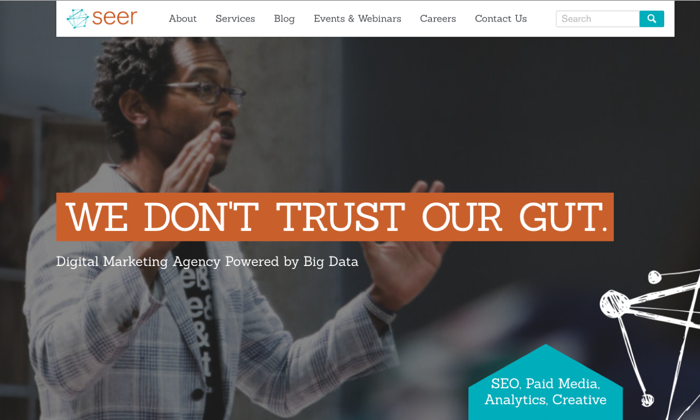
Seer Interactive doesn’t trust their gut; they use their data warehouse and tools to look across millions of keywords instantly. Using big data, they look for new, hidden, and unexpected customer trends in competitive industries. They’re one of the few agencies with a big query environment of 202 million SERP records.
3. Distilled – Best for Technical SEO
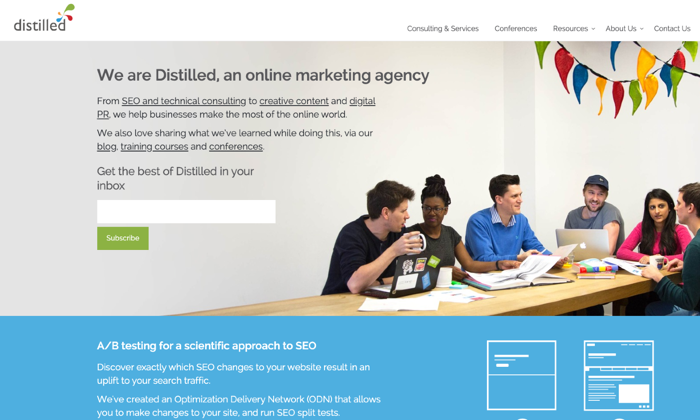
As an agency, Distilled builds its content marketing campaigns around technical SEO. All of the services they offer are oriented around search. Distilled created an Optimization Delivery Network (ODN) that allows clients to make changes to their site and run SEO split tests.
4. Fractl – Best for In-Depth, Research-Heavy Content
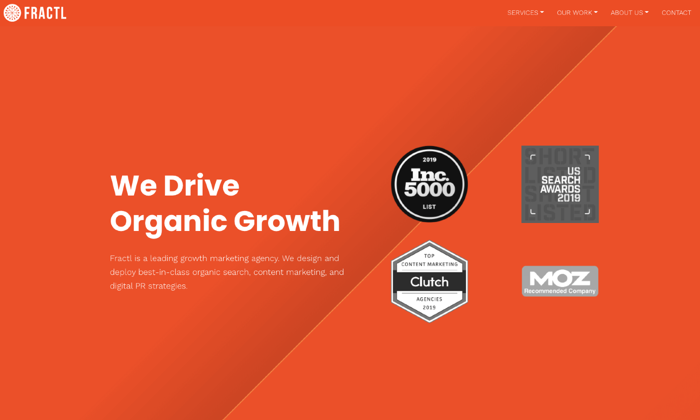
Fractl is a research-heavy, data-driven content marketing agency. They focus on rapid organic growth via a combination of content marketing, data journalism, digital PR, and SEO. They have deep knowledge in specific industries, and they publish original research in journals and well-known publications.
5. Column Five – Best for Data and Content Visualization
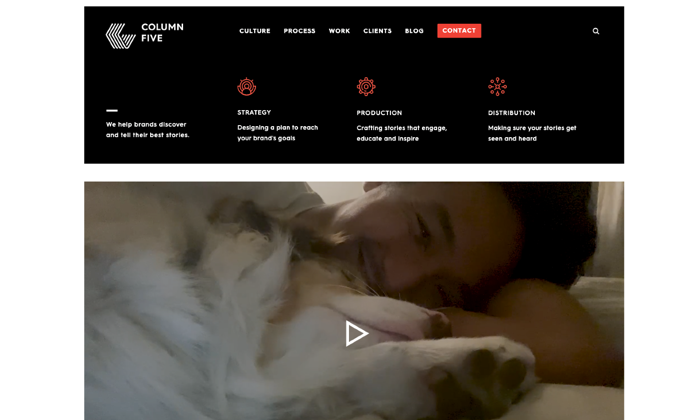
As a content marketing agency, Column Five is focused on the creative side of content development — storytelling, design, data visualization, interactive motion graphics, and exhibition design. Creativity is the priority; their agency uses a mix of organic and paid distribution to promote client content.
8. Single Grain – Best for Conversion-Driven Content Marketing
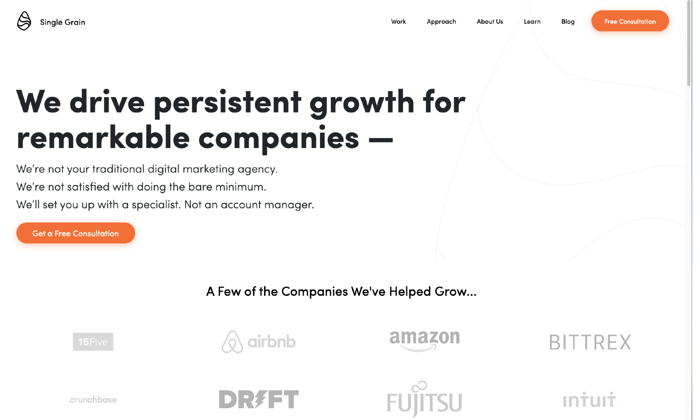
Single Grain uses its content marketing and conversion optimization services to boost client conversions. They’re focused on rapid and consistent growth for each of their clients.
9. The Content Bureau – Best for B2B Content Marketing
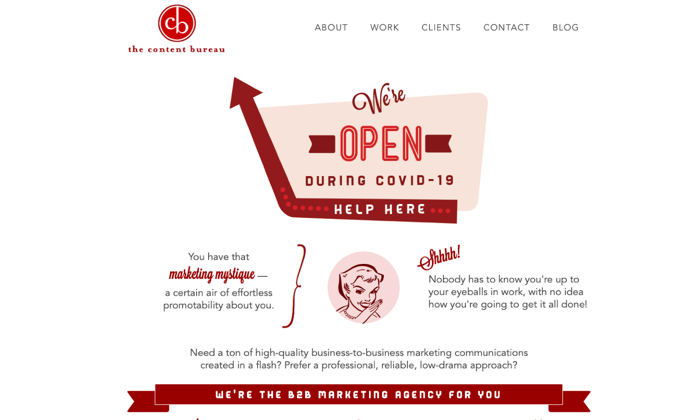
These B2B content marketing specialists are woman-owned, 90 percent female, and fully remote. They’re focused almost exclusively on clients in the tech, VC, and financial sectors, focusing their attention on global corporations that need consistent, year-over-year growth.
10. Web Profits – Best for SaaS Content Marketing

Webprofits focuses exclusively on SaaS content marketing and advertising. These SaaS specialists use their experience as SaaS business owners to build other SaaS clients. They work with large and small clients, including Rackspace and Shopify.
Conclusion
It can be tough to show up day after day with fresh content for your customers. The right content marketing agency makes content development simple and straightforward. Choosing the right content marketing agency isn’t rocket science; you just have to ask the right questions.
It starts with your goals and outcomes.
If you’re aware of the goals and outcomes you want, you’ll know which metrics you need to track to reach those goals. With the right goals and metrics, you’ll be able to find, vet, and choose the right content marketing agency — you’ll have the team you need to generate more revenue for your business.
The post How to Choose The Right Content Marketing Agency appeared first on Neil Patel.
Original Entry: How to Choose The Right Content Marketing Agency is shared from https://neilpatel.com/blog/content-marketing-agency/ via https://neilpatel.com
Check out the original post, How to Choose The Right Content Marketing Agency that is shared from https://putyourfamilyfirst.wordpress.com/2020/09/10/how-to-choose-the-right-content-marketing-agency/ via https://putyourfamilyfirst.wordpress.com
No comments:
Post a Comment